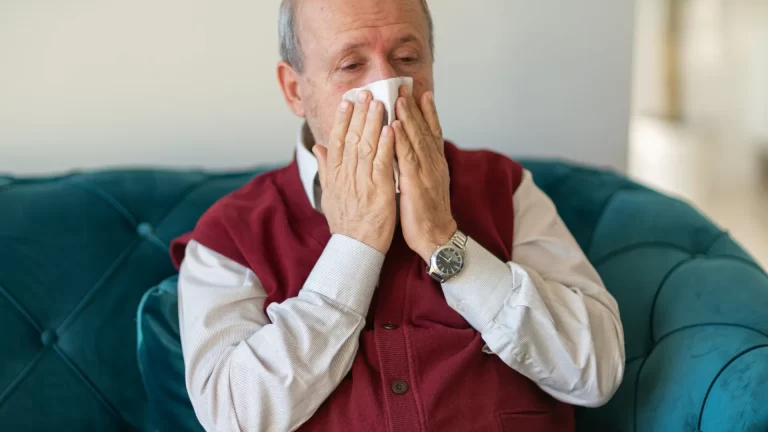Wichtige Punkte
- Flu and COVID-19 vaccines can be co-administered safely, offering combined protection during respiratory virus season.
- High-dose and adjuvanted flu vaccines significantly reduce hospitalization risks in adults aged 65+, with some studies showing up to a 62% reduction over standard-dose shots.
- In the 2024–25 season, flu vaccines cut medically attended illness by 51–57% and hospitalization rates by 38–55% in seniors.
- The CDC and ACIP now recommend enhanced vaccines—HD-IIV3, aIIV3, or RIV4—as the preferred options for older adults.
- Vaccine uptake among seniors remains inconsistent due to misinformation, access gaps, and disparities.
Warum das wichtig ist
Adults aged 65 and older account for 70–85% of flu-related deaths and 50–70% of hospitalizations, according to the U.S. Centers for Disease Control and Prevention (CDC) (CDC, 2024). With aging comes immune system decline, which increases vulnerability to respiratory infections and complicates recovery.
Flu vaccines remain one of the most effective tools to prevent severe outcomes—but not all vaccines are equally effective for seniors.
What’s New in the 2024–2025 Season
New interim data from the CDC’s Influenza Vaccine Effectiveness Network show that for adults 65+, the vaccine reduced:
- Medically attended flu illness by 51–57%
- Hospitalizations by 38–55%
(CDC, 2025)
This protection is even more pronounced with enhanced vaccines—high-dose (HD-IIV3) and MF59-adjuvanted (aIIV3) formulations. A large retrospective study of nearly half a million seniors showed:
- High-dose vaccine reduced hospitalizations by ~25%
- Adjuvanted vaccine cut hospitalizations by ~62%
(Kaiser Permanente, 2024)
Though both types outperformed standard-dose vaccines, a 2024 randomized head-to-head study found no significant difference between the high-dose and adjuvanted versions in preventing flu illness (CSL Seqirus, 2024).
Science Behind Enhanced Vaccines
Aging affects immune function—a process known as immunosenescence—leading to a weaker response to traditional flu vaccines. Enhanced vaccines counter this by either:
- Increasing antigen dose (e.g., Fluzone High-Dose)
- Using an adjuvant, such as MF59, to stimulate a stronger immune response (e.g., Fluad)
These tools are essential for helping older immune systems produce adequate protection against the influenza virus.
Updated CDC Recommendations
As of 2025, the CDC’s Advisory Committee on Immunization Practices (ACIP) recommends that adults aged 65+ receive one of the following flu vaccines:
- HD-IIV3 (High-Dose Inactivated Influenza Vaccine)
- aIIV3 (MF59-Adjuvanted Inactivated Influenza Vaccine)
- RIV4 (Recombinant Influenza Vaccine)
These are preferred over the standard-dose option, though standard vaccines are still acceptable if no enhanced version is available (CDC, 2025 Immunization Schedule).
Barriers to Access and Uptake
Despite strong evidence, vaccine uptake among seniors remains far from optimal. CDC data show that only about half of adults over 65 get vaccinated each flu season (AP News, 2025).
Several factors contribute to this:
- Misinformation, especially about ingredients like thimerosal
- Lack of awareness about enhanced options
- Access disparities, particularly in rural and minority communities
Recent federal actions to phase out thimerosal from vaccines, though intended to streamline safety protocols, have inadvertently amplified public confusion (BioPharma Dive, 2025).
Flu and COVID-19 Vaccine Co-Administration
The CDC and health professionals now recommend co-administering flu and COVID-19 vaccines, particularly for seniors, to streamline care and ensure seasonal protection. A 2024 AP report emphasized the safety and efficiency of this approach, with no additional risk compared to getting each shot separately (AP News, 2025).
Broader Public Health Impact
Vaccinating seniors reduces not just flu cases, but also:
- Emergency room visits
- ICU stays
- Long-term recovery times
This lowers burdens on caregivers and public systems such as Medicare, while improving quality of life for aging populations.
Modeling by the CDC shows that shifting even 25% more seniors to enhanced vaccines could prevent thousands of hospitalizations annually.
What Seniors and Caregivers Can Do
- Ask specifically for Fluzone High-Dose, Fluad, or RIV4 at clinics and pharmacies.
- Time your shot ideally in September or October, though later is still better than not at all.
- Discuss any concerns with a health professional—particularly regarding ingredients or timing.
- Stay current on RSV and COVID-19 vaccine schedules, especially if you’re at high risk.
Quellen
- CDC. “People 65 Years and Older & Influenza.” cdc.gov
- CDC. “Interim Estimates of 2024–25 Seasonal Influenza Vaccine Effectiveness.” cdc.gov
- Kaiser Permanente Southern California Research. kp-scalresearch.org
- CSL Seqirus. “IDWeek 2024 Data.” cslseqirus.us
- CDC. “2025 Recommended Adult Immunization Schedule.” cdc.gov
- AP News. “Don’t Wait for a Holiday Surge…” apnews.com
- BioPharma Dive. “HHS to Phase Out Thimerosal…” biopharmadive.com
Der Artikel stellt in keiner Weise eine medizinische Beratung dar. Bitte konsultieren Sie einen zugelassenen Arzt, bevor Sie eine Behandlung beginnen. Diese Website kann Provisionen für die in diesem Artikel erwähnten Links oder Produkte erhalten.
Last Updated on Juli 25, 2025




Great news—flu shot really helps seniors stay protected
Loved reading how vaccines boost easy year-round health for older adults.
Good to know the flu jab works well for seniors—reassuring